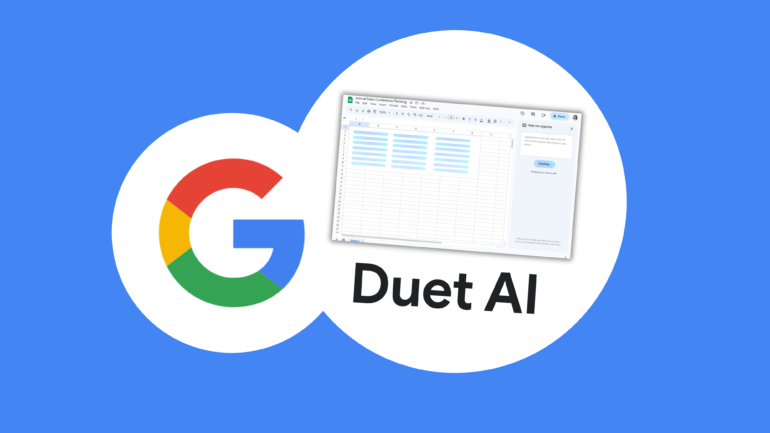TL;DR:
- Google’s Duet AI, a suite of generative AI capabilities, is extending its reach within Google Cloud.
- Duet AI’s features include code refactoring, infrastructure guidance, deployment optimization, and API design.
- Developers can interact with Duet AI using natural language prompts for rewriting code and enhancing databases.
- The AI offers context-aware code suggestions and solutions that are customizable for enterprises.
- Duet AI is tightly integrated with BigQuery, Looker, Apigee, and Cloud Workstations.
- The AI’s journey reflects both innovation and challenges in AI-generated coding tools.
Main AI News:
In a strategic move, Google’s trailblazing suite of generative AI capabilities, known as Duet AI, is primed to make its mark across a myriad of new products and services within the expansive realm of Google Cloud. Unveiled at the annual Cloud Next conference, this innovative suite, though still in the preview phase, is poised for general availability later this year. Duet AI’s potential to reshape workflows and enhance efficiencies is being recognized as it permeates domains like code refactoring, infrastructure configuration, deployment optimization, and even API design.
Duet AI’s prowess is pronounced in its adeptness at code refactoring – an art of enhancing code by introducing minor changes while preserving the core external behavior. Developers basking in their preferred software development environment can now seamlessly engage with Duet AI through a natural language-driven chat interface. This interaction empowers them to effortlessly task the AI with rewriting functions and, intriguingly, transforming database connections into managed relational databases, all without altering the fundamental behavior of the code.
The saga continues as Google Cloud’s grandeur steps into the spotlight. Operators navigating the Google Cloud Console are now privileged to engage in insightful conversations with Duet AI. This cutting-edge partnership seeks to unravel the mystique shrouding infrastructure configuration, deployment strategies, as well as cost and performance optimization. The console, which serves as a hub for creating, deploying, and managing web applications and services, is set to embrace Duet AI’s cognitive capabilities, ushering in an era of enhanced guidance and problem-solving.
Across the horizon, in Cloud Workstations, Google’s freshly minted development environment, Duet AI assumes the role of a proficient coding companion. The AI not only aids in code creation but also emphasizes best practices, seamlessly aligning with the developers’ quest for excellence. Beyond this, Duet AI’s talents are flexed in Application Integration, a realm where no-code tools orchestrate software-as-a-service apps within Google Cloud. Here, Duet AI masterfully assembles flows using existing APIs and assets, all the while generating comprehensive documentation and test cases.
Google’s proclamation of customization capabilities adds a layer of intrigue to Duet AI’s narrative. Select enterprises are granted the privilege of infusing AI with their proprietary knowledge, enabling it to conjure contextually aware code suggestions. The result? Tailored solutions that resonate with the intricacies of specific organizations be it generating code for sifting through a product catalog or other bespoke functionalities.
Venturing further, Duet AI’s affiliation with Apigee, Google’s premier API management platform, materializes as a key enabler of API design. Through newly established connectors, Duet AI now navigates the terrain of transforming natural language prompts into API blueprints. This integration channels the power of language into the world of APIs, effectively bridging the gap between intention and execution.
The grand finale of Duet AI’s triumphant saga unfolds within the realms of BigQuery and Looker. In BigQuery, the AI’s collaborative disposition surfaces, offering real-time SQL query and Python code suggestions. It brings the allure of context-aware assistance, supplemented by auto-generated code blocks and explanatory insights. Notably, the AI’s repertoire extends to generating vector embeddings, the very foundation of semantic searches and recommendation inquiries.
Equally captivating, Duet AI’s prowess extends to Vertex AI, Google’s platform for constructing, training, and deploying machine learning models. This avenue empowers users to mold the text-to-code model underlying Duet AI, aligning it seamlessly with their coding standards and practices.
In Looker, a new era of insights dawns with Duet AI’s contextual prowess. It infuses rich context into insights and reporting, bolstering the platform’s capabilities. A conversational interface reminiscent of AI-powered chatbots emerges, allowing users to extract business insights from data using natural language.
As the narrative comes full circle, Duet AI’s seamless integration into Google’s comprehensive ecosystem stands as a testament to the company’s commitment to innovation. While the AI’s potential is vast, critics underscore the challenges inherent in AI-generated coding tools. The careful balance between context and creativity remains elusive, as showcased by instances of security vulnerabilities and coding missteps.
Furthermore, the intricacies of copyright pose a formidable challenge. Duet AI’s lineage in publicly available code raises pertinent questions about its compliance with copyright regulations. To alleviate concerns, Google mandates the citation of sources for AI-generated code suggestions, emphasizing transparency and accountability.
Conclusion:
Duet AI’s integration across Google Cloud signals a transformative shift in how businesses approach code optimization, infrastructure configuration, and API design. The expansion of its capabilities, coupled with contextual assistance, provides a significant competitive advantage. While AI holds the potential to revolutionize workflows, it also faces the challenge of ensuring precision and context in code generation. The market can anticipate a dynamic landscape where AI collaboration is harnessed to enhance productivity while navigating the intricacies of software development.

